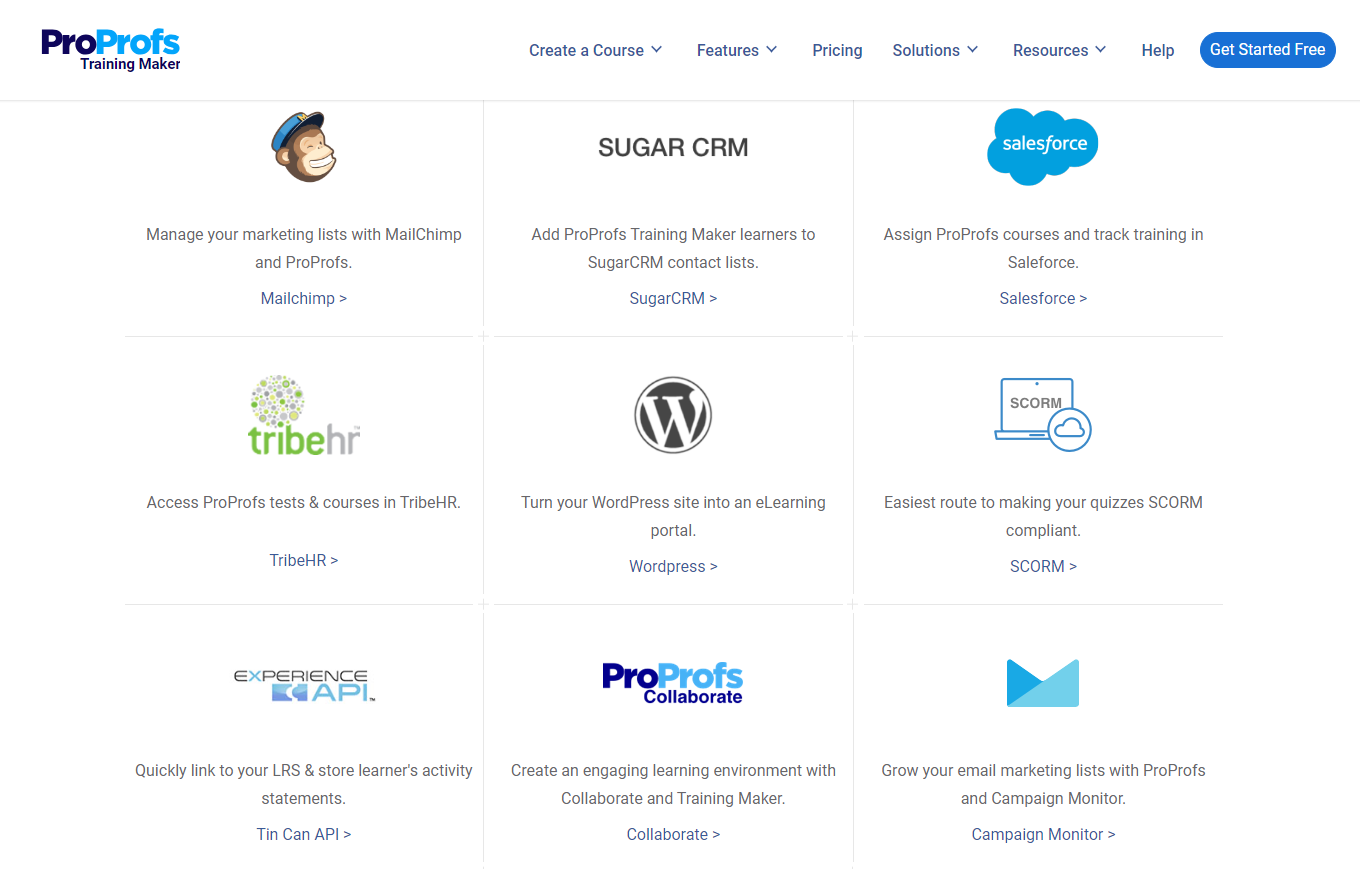“AI is one of the most profound things we’re working on as humanity. It’s more profound than fire or electricity.” – Sundar Pichai, CEO, Alphabet Inc.
After years of watching teams grow and companies scale, one truth stands out: how we train people can make or break a business.
The problem? Training often feels like a chore. Courses are too generic. Admin tasks never end. And it’s tough to tell what’s really working.
But in 2025, that’s changing. AI LMS (Learning Management Systems) are rewriting the rules. These platforms train smarter, not just faster. They personalize learning, automate admin work, and offer real-time insights so leaders can make better decisions.
With the global e-learning market expected to exceed $450 billion by 2028, the message is clear: evolve your training strategy or get left behind.
Whether you’re a CEO, HR leader, or L&D pro, this article is for you. We’ll explore what makes AI LMS tools different and reveal the top 7 platforms reshaping training this year.
Let’s dive in.
What Is an AI LMS?
An AI-powered learning management system uses artificial intelligence to make training faster, easier, and more personal. It helps you create, deliver, and track learning without manual overload.
Example: Upload a PDF or Word doc—AI instantly turns it into a course. Add learners in bulk. Assign roles. Track progress in real time. Need a refresher course? The LMS sends auto-reminders.
AI LMS platforms also support various formats—videos, presentations, interactive quizzes—and automate routine tasks like certification.
Want a quick look at how it works? Watch:
Core Features of AI LMS That Drive Results
A good AI LMS is built to make your training easier to manage, faster to set up, and more effective for your learners. Here’s what you can expect:
1. Real-Time Personalization
How to apply it:
With an AI LMS, you don’t need to manually adjust learning paths for every learner. The system automatically tailors content based on their individual progress, skill gaps, and learning behavior. If a learner is struggling with a concept, the system will suggest easier materials or extra practice, allowing them to catch up without you needing to intervene.
Why it matters:
- Saves time by automating personalized learning paths
- Learners progress at their own pace, leading to better engagement and retention
- Reduces the manual effort of adjusting courses for each person
2. Fast Course & Quiz Creation
How to apply it:
Instead of spending hours creating training materials from scratch, simply upload your existing PDFs or Word documents into the LMS. The AI will automatically convert them into structured courses and quizzes, even mapping out learning paths for you. This is especially helpful when you have multiple training programs to manage simultaneously.
Why it matters:
- Reduces course creation time significantly
- Automates the transition from content to interactive courses
- Enables you to easily manage multiple training programs at once
Watch this quick video to see how easy it is:
3. Certification Automation
How to apply it:
Once a learner completes a course, the AI LMS automatically issues certificates, customized with your branding. You can also set rules for certification, like minimum scores or deadlines, ensuring your standards are always met.
Why it matters:
- Reduces administrative tasks by automating the certification process
- Helps you maintain standardized training outcomes
- Increases learner satisfaction by recognizing achievements quickly
Pro Tip: You can even set rules for certification — like minimum scores or expiry date— to make sure your training standards are always met.
4. Central Virtual Classroom
How to apply it:
Your virtual classroom serves as your training command center. From a single dashboard, you can assign courses, track progress, send announcements, and group learners into classes. You can also easily manage instructors and monitor completion rates.
Why it matters:
- Centralizes your training operations for easy management
- Tracks progress in real-time to ensure nothing falls through the cracks
- Scales easily as your team grows, saving you time on logistical tasks
Want to set up your own virtual classroom? Explore how easy it is to manage training from one place:
5. AI-Powered Content Updates
How to apply it:
AI takes the burden of content updates off your shoulders by automatically pulling in fresh material from trusted sources. This means your learners always have access to the most relevant, up-to-date content, without you needing to manually update every course.
Why it matters:
- Ensures that your team is always learning the latest information
- Reduces the manual effort of updating training materials
- Keeps your training relevant and aligned with industry trends
6. Gamified, Interactive Learning
How to apply it:
Use AI to gamify your training programs by incorporating quizzes, badges, points, and scenario-based learning. This makes learning fun and encourages higher engagement and better retention.
Why it matters:
- Motivates learners with rewards and gamified elements
- Increases engagement and knowledge retention
- Turns training into an interactive, enjoyable experience

7. Seamless Integrations
How to apply it:
Ensure your LMS integrates easily with tools you already use, like Google Meet for live sessions or payment gateways for courses you sell. The AI LMS connects with your existing tools, creating a smoother, more efficient workflow.
Why it matters:
- Reduces manual entry and streamlines your processes
- Offers flexibility with third-party integrations
- Creates a more cohesive experience across your tools
8. Scalable User Management
How to apply it:
Whether you’re onboarding 10 or 1,000 learners, an AI LMS makes user management simple. Upload users in bulk, assign roles, and manage access with ease. As your team grows, the system scales with you—no extra tools required.
Why it matters:
- Saves time with bulk uploads and easy user role assignments
- Scales with your organization as your learner base grows
- Makes it easy to control access and track progress at any scale
9. Predictive Analytics
How to apply it:
With real-time tracking and predictive analytics, you’ll always know where your learners stand. The system highlights learners who are falling behind, and even predicts future skill gaps so you can intervene early.
Why it matters:
- Prevents issues before they escalate by forecasting skill gaps
- Ensures you’re providing the right support at the right time
- Helps you make data-driven decisions to improve training outcomes
In fact, a 2025 case study from Morocco showed that AI-driven predictive models can identify students at risk of dropping out with 88% accuracy, making it easier to step in early and provide the right support. Plus, if you run compliance training, you’ll have audit-ready reports at your fingertips, keeping everything organized and inspection-ready.
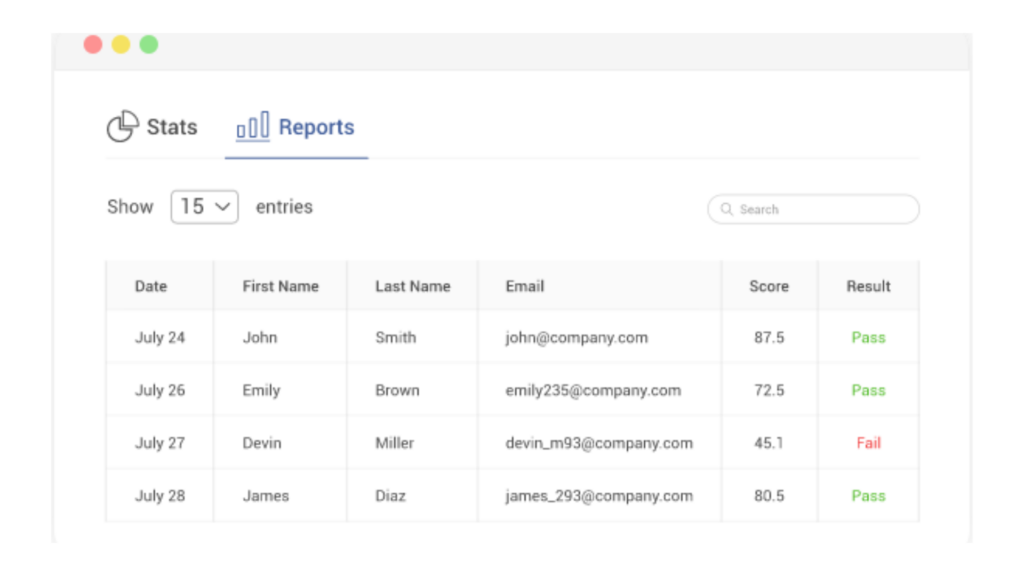
10. Compliance Automation
How to apply it:
For compliance-heavy topics like data privacy or workplace safety, your AI LMS helps by including pre-built courses and sending automated reminders for retraining when necessary.
Why it matters:
- Ensures compliance training is always up-to-date
- Reduces the risk of missing critical compliance deadlines
- Keeps your team audit-ready with minimal effort
Top AI LMS Platforms in 2025
After thorough research, I’ve come up with several AI-based learning management systems for 2025. Each one offers smart features to help you create, manage, and scale training with less effort.
Before I explain the tools, check out the list of tools you’ll be reading on:
| AI LMS | Best For | Pricing |
|---|---|---|
| ProProfs Training Maker | Employee Training & LMS | Free plan available; paid plans start at $1.99/learner/month. |
| Absorb LMS | Complex Training Needs | Custom pricing. |
| 360Learning | Collaborative Learning | Starts at $8/user/month. |
| Docebo | Complex Enterprise Training | Custom pricing. |
| LearnUpon | Delivering Impactful Training | Custom pricing. |
| Paradiso LMS | Rich Customizations | Custom pricing. |
| Cornerstone OnDemand | Very Large Enterprises | Custom pricing. |
1. ProProfs Training Maker – Best for Employee Training & LMS
After extensively using ProProfs Training Maker for our company’s onboarding and upskilling initiatives, I can confidently say it managed our entire training process. I found it incredibly easy to create visually appealing courses using their vast library of customizable templates and the drag-and-drop interface.
Integrating our existing training materials, like PPTs and videos, saved us a ton of time. The platform’s versatility allowed me to build various types of content, including interactive quizzes with different question formats like multiple-choice, fill-in-the-blanks, and video responses.
Another aspect that significantly improved our training effectiveness was the detailed reporting and analytics. I could easily track individual and group progress, identify knowledge gaps, and even generate completion certificates. This data-driven approach helped us tailor our training content and identify areas that needed improvement.
Check out how GLS, a leading logistics provider, improved training efficiency and employee engagement using ProProfs Training Maker:

What You’ll Like:
- AI Course Creator to quickly build courses using existing materials like webpages, videos, and docs.
- Intuitive in-line AI editor to update courses seamlessly; you can edit directly without starting over.
- Prebuilt courses to kickstart your training with ready-made, customizable courses on various topics
- Virtual Classrooms to host interactive sessions with real-time monitoring of participation and engagement.
Pricing:
Free plan available; paid plans start at $1.99/learner/month.
2. Absorb LMS – Best for Complex Training Needs
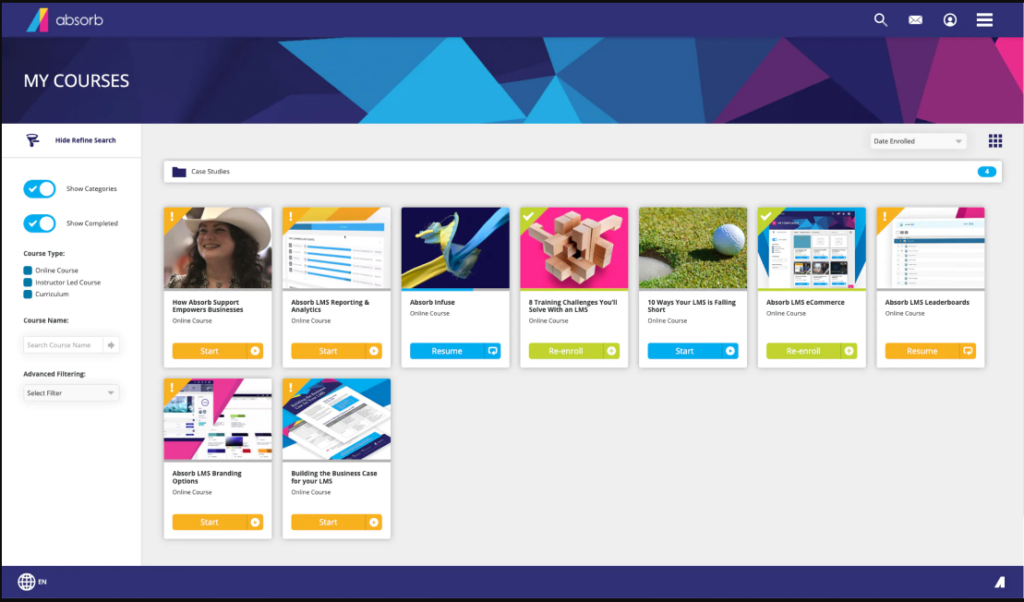
I tried using Absorb LMS and it truly stood out in handling complex training requirements. As an AI LMS system, it provided me with an intuitive platform to manage a variety of training modules, from compliance to advanced technical skills.
What I loved most was its AI-powered recommendation engine, which personalized learning paths for each employee based on their progress and performance. The customization options were extensive, helping me to create tailored training programs to fit our unique needs.
The reporting tools were effective, giving me real-time insights into learner performance and training effectiveness, helping me make data-driven decisions. It also integrated easily with other tools we were already using, like Zoom for live sessions.
What You’ll Like:
- AI-powered course creation with Absorb Create to design courses quickly.
- Intelligent quiz generation to automatically generate quizzes that align with the course content.
- Personalized upskilling to curate content from a library of over 20,000 courses based on each employee’s skill level and career goals.
- Predictive content recommendation helps employees stay on track and keeps them engaged with training that matters to them.
Pricing:
Custom pricing
3. 360Learning – Best for Collaborative Learning
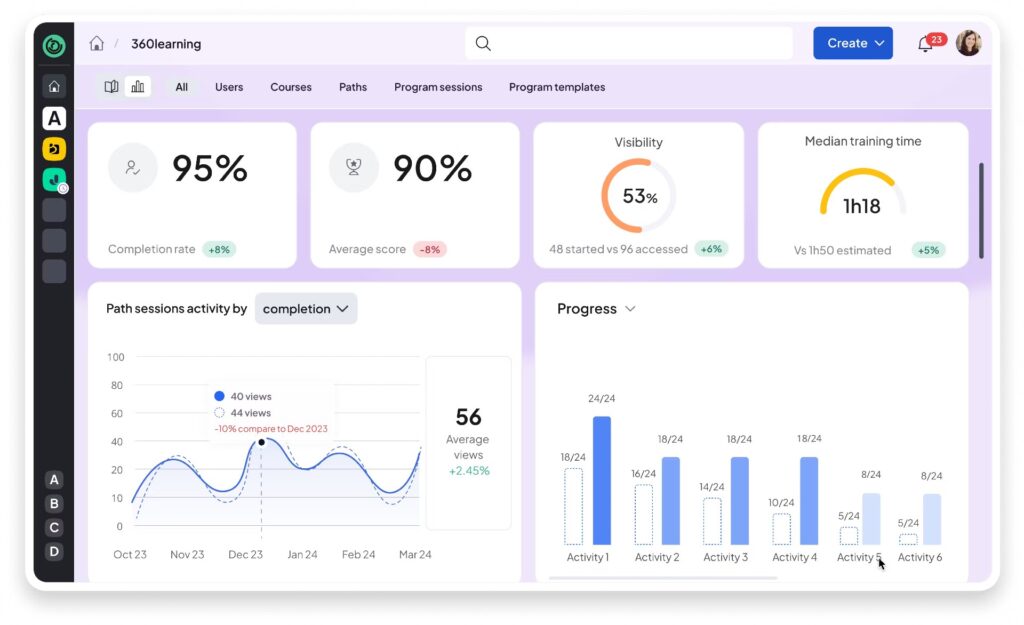
I was looking for something that really encouraged teams to learn from each other. That’s where 360Learning really clicked for me. It easily blended traditional LMS features with more modern LXP capabilities and collaborative tools.
Its collaborative course creation tool made it easy for subject matter experts to contribute without needing technical expertise. The platform’s AI features were a significant help, too. The AI assisted our experts in generating course outlines, suggesting quiz questions based on the content, and even helping tag content with relevant skills.
This made it a powerful AI-powered LMS that helped personalize the learning paths and identify skill gaps across the organization
The platform also provided real-time analytics that gave me deep insights into how well my team was engaging with the content. 360Learning’s integration with other tools like Slack and Google Meet made it even more convenient for live learning sessions and team collaboration.
What You’ll Like:
- AI-powered question generator to automatically suggest relevant quiz questions based directly on the course content
- Drag-and-drop course builder to make content creation super quick, even for non-experts
- Easy integration with collaboration tools like Slack and Google Meet
- AI content curation to help curate the most relevant learning content based on learner behavior
Pricing:
Starts at $8/user/month.
4. Docebo – Best for Complex Enterprise Training
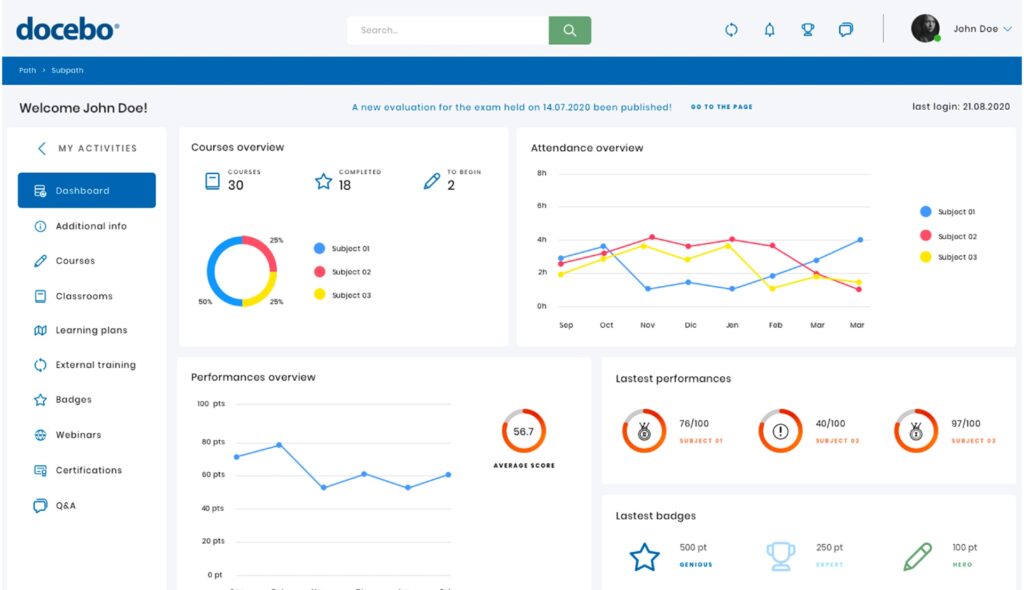
As an AI-enabled LMS, Docebo offered everything I needed to manage large-scale training efficiently. I found its modular structure particularly useful; you could essentially build the platform you needed using components like Docebo Learn (the core LMS), Docebo Shape (for AI-powered content creation), and Docebo Content (access to pre-built courses).
The platform’s AI-powered features helped me personalize learning paths for each employee, ensuring that the content was relevant to their individual needs and progress. The AI also streamlined content management through features like automatic skill tagging and assisted content generation via Docebo Shape.
I also loved the powerful reporting and analytics tools, which gave me real-time insights into employee performance and learning effectiveness. The mobile-friendly interface made it easy for employees to access training from anywhere and made it a perfect fit for our enterprise-level needs.
What You’ll Like:
- Powerful automation engine for tasks like course enrollment, assignments, and notifications
- AI-powered Deep Search to analyze content deeply and return highly relevant results
- Coach & Share module to enable informal learning by helping users to share their own content
- Gamification features like leaderboards, badges, and certificates to increase learner engagement and motivation
Pricing:
Custom pricing.
5. LearnUpon – Best for Delivering Impactful Training
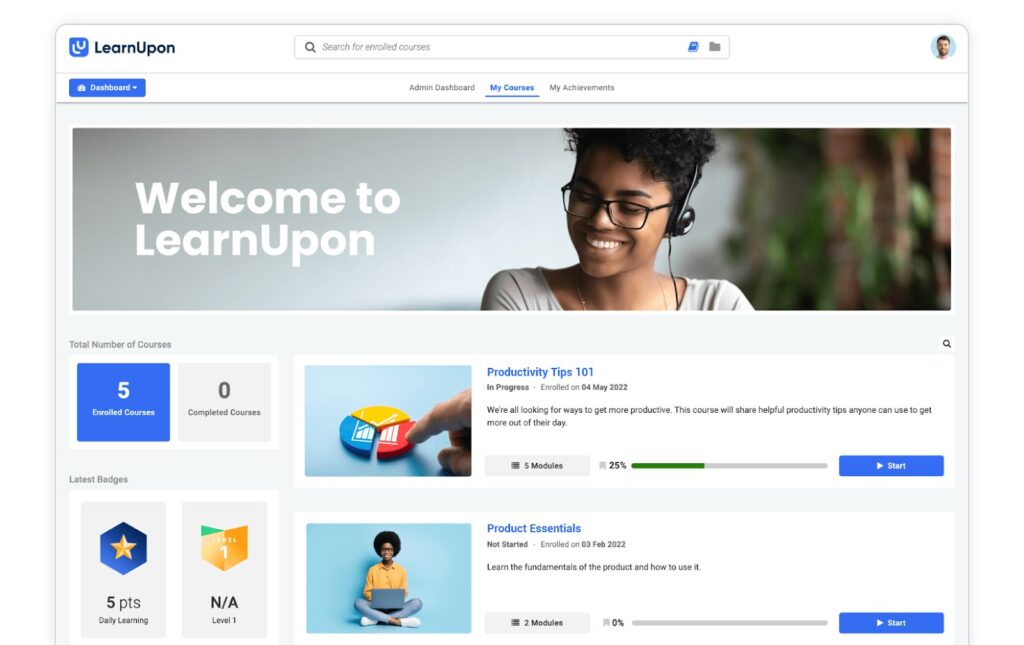
When the goal was to deliver training programs that genuinely made an impact, LearnUpon emerged as a suitable option. Building out courses was simple; it supported various content types we already had, like SCORM files, videos, PDFs, and presentations, and helped us to structure them into clear Learning Paths.
To ensure the training was impactful, LearnUpon provided solid tools for assessment – exams with different question types, assignments learners could upload, and surveys to gather feedback.
While perhaps not having the most extensive AI suite on the market initially, I saw it developing as an lms with AI capabilities, particularly with features like Learning Journeys, which helped automate personalized learning workflows based on learner data
This ability to tailor the learning path and track progress through detailed reports allowed us to better understand and demonstrate the training’s effectiveness.
What You’ll Like:
- The Learning Journeys feature to create automated, personalized learning sequences based on learner data
- Dynamic rule-based group management to automatically assign users to specific groups based on their profile data
- Multilingual support, which is ideal for global teams and international learners
- Detailed portal customization creates distinct learning environments for different audiences under one account
Pricing:
Custom pricing.
6. Paradiso LMS – Best for Rich Customizations

As an AI LMS system, Paradiso LMS offered AI-driven features that helped personalize learning experiences. I could change almost anything – the colors, the layout, putting our brand everywhere, setting up the main screens the way we liked.
On top of all that customization, it did all the standard things you’d expect. I could build courses using different kinds of files, manage all our employees and team structures, set up step-by-step learning plans, and keep an eye on performance linked to training.
It lets us create separate learning ‘zones’ (they call them portals) for each group, like one zone for employees and another for customers, each with its own unique look and feel. As an AI LMS system, it had clever tools that could help suggest course ideas, recommend specific training to users, and offer helpful computer ‘chatbots’ to answer questions.
What You’ll Like:
- Multi-tenancy architecture for fully separate, branded portals for different audiences
- Strong built-in eCommerce capabilities for selling courses directly through the platform
- AI authoring tool (CogniSpark) to help in quickly generating courses from prompts, added and multi-language AI voice-overs
- Comprehensive Blended Learning support with tools for scheduling sessions, managing room/resource bookings, and tracking attendance
Pricing:
Custom pricing.
7. Cornerstone OnDemand – Best for Very Large Enterprises
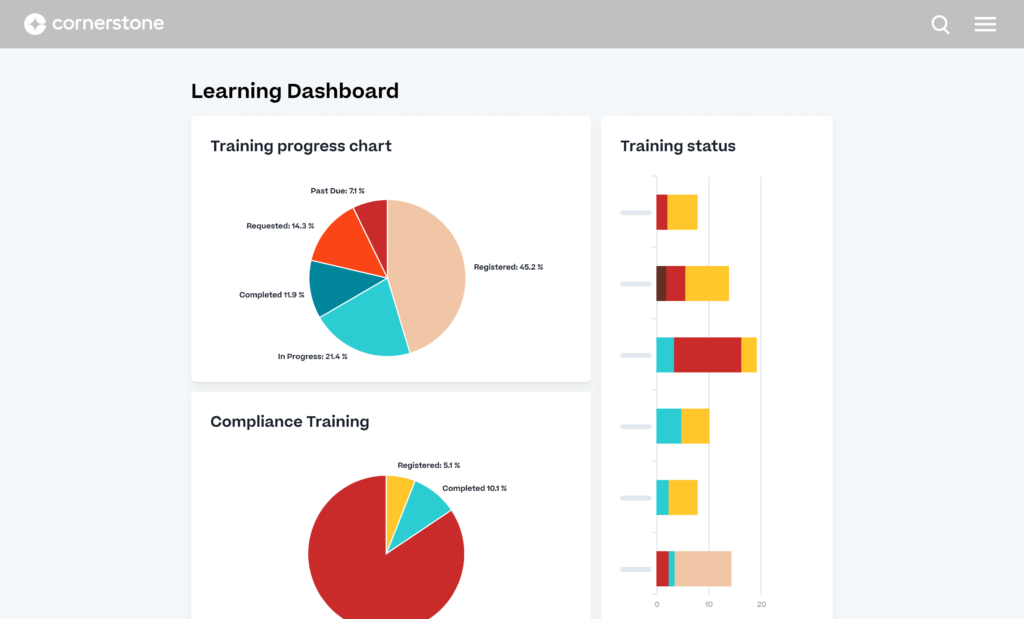
Cornerstone OnDemand’s AI-driven LMS transforms how big organizations manage, deliver, and track training. Its AI-driven algorithms helped personalize learning for each employee, suggesting courses based on their progress and career goals.
The effective content management system lets me upload, organize, and deliver training content in various formats, from SCORM and video to documents. Its seamless integrations with systems like Salesforce, Zoom, and Microsoft Teams streamlined workflows across different tools.
The real-time analytics and reporting features gave me powerful insights into learner progress, helping me track completion rates and assess training effectiveness with ease. I also appreciated the automated compliance tracking and certification capabilities, which saved time and ensured we stayed compliant across different regions.
What You’ll Like:
- AI-based personalization to adapt to each learner’s behavior, ensuring the right content at the right time
- Talent management features like performance management, succession planning, and employee development
- AI-powered course recommendations and personalized learning paths
- Automated compliance tracking and certification management for different industries
Pricing:
Custom pricing.
How to Create a Course Using AI LMS
Creating a course doesn’t have to be a time-consuming, manual process. Here, we’ll walk you through the process of creating a course using ProProfs AI LMS—a platform designed to help you create courses with ease and speed.
Step 1: Launch AI Course Creation
Once you’re logged into your ProProfs Training Maker dashboard, click the arrow next to the “+Create a Course” button. From the dropdown menu, select “Create Using ProProfs AI”. This is the starting point to harness the power of AI for course creation.
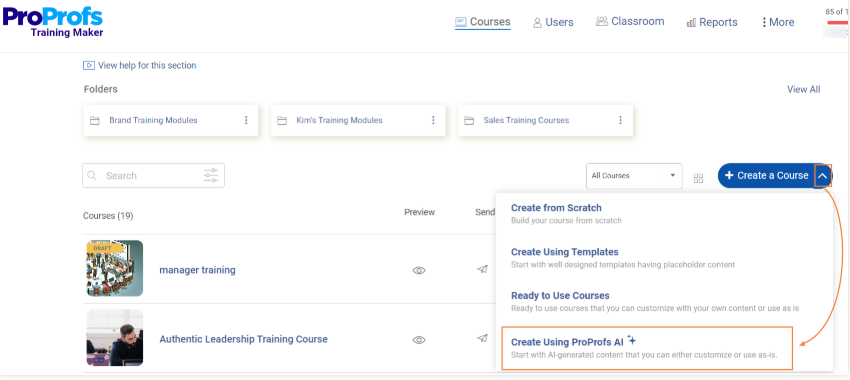
Step 2: Add Course Details
Now, it’s time to set the foundation for your course. You’ll need to fill out the following fields:
- Course Topic: Let ProProfs AI know what your course is about. For example, you might enter “Cybersecurity Awareness” for employees.
- Course Description: Briefly describe what your course will cover. This helps AI generate relevant content aligned with your goals.
- Add External Resources: If you have existing resources, such as a web page or YouTube video, you can paste the link in the “Provide existing resources” field.
Once you’ve entered the necessary details, click “Next” to move on.

Step 3: Define Structure
At this point, you’ll determine the structure of your course. This step is essential for laying out your content.
- Set the Number of Chapters: Decide how many chapters you want in your course. For example, if you’re creating a cybersecurity course, you could have chapters like “Phishing,” “Password Protection,” and “Data Protection.”
- Specify Pages Under Each Chapter: Add pages to break down each chapter into digestible content.
- Include Quizzes: Add quizzes for each chapter to reinforce learning and engage your audience.
Once you’re satisfied with your layout, click “Generate with ProProfs AI.” The AI will now begin generating your course content based on the details you’ve provided.
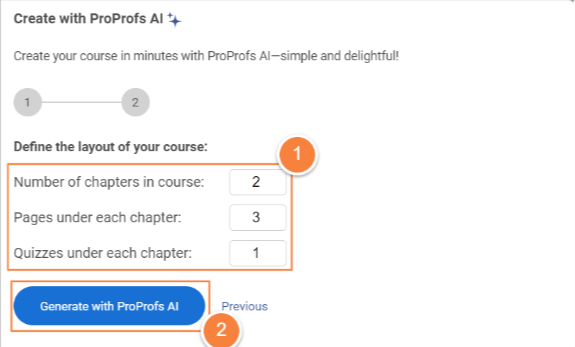
The AI will take some time to create the course. Click “Done” to return to the Training Maker dashboard.
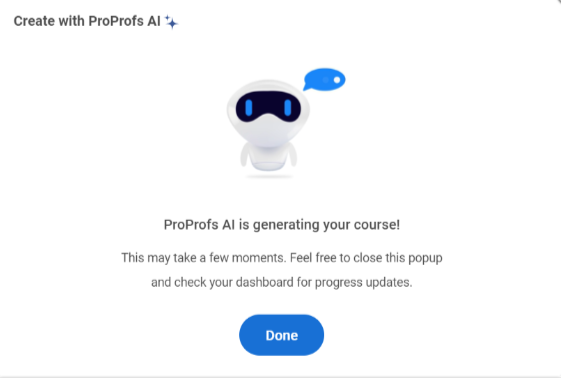
Step 4: Edit AI-Generated Course
After the AI processes your inputs, your course will be generated and appear on your ProProfs Training Maker dashboard. To review and make any changes, hover over the course and click “Edit”. Here, you can refine the content, add more details, adjust quizzes, and ensure everything aligns with your training goals.
Step 5: Finalize and Launch
Once you’ve finished editing, it’s time to review everything. Go through each chapter, quiz, and resource to make sure the course is just right. After reviewing the content, click “Done” to finalize the course. Your course is now ready to be launched and delivered to your learners.
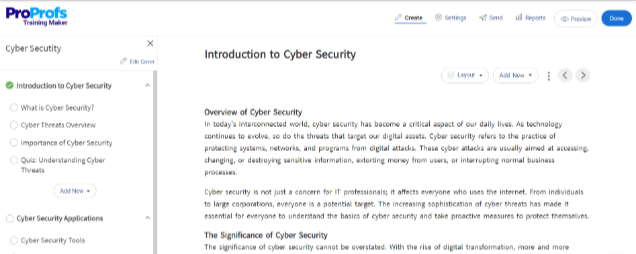
By using ProProfs AI LMS, you’ve just created a course in minutes—not hours or days. AI takes care of the heavy lifting, allowing you to focus on refining the material and enhancing the learning experience for your team.
Ready to create your own AI-powered course?
Click below to watch our step-by-step guide and start building smarter training today!
Get Free LMS Software — All Features, Forever.
We've helped 567 companies train 200,000+ employees. Create courses in under a minute with our AI LMS or use 200+ ready-made courses on compliance, harassment, DEI, onboarding, and more!
AI LMS vs. Traditional LMS
While traditional LMS platforms have been the backbone of training for years, AI-powered LMS is changing the scenario by adding personalization, automation, and smarter learning. Let’s compare how they stack up against each other.
| Feature | AI LMS | Traditional LMS |
|---|---|---|
| Personalization | AI adapts content based on learner progress and behavior, offering a tailored experience for each learner. | Content is static and usually the same for every learner. |
| Course Creation | AI generates courses and quizzes quickly from existing content like PDFs or Word documents, saving you hours of work. | You need to create courses manually, which can be time-consuming. |
| Learning Pathways | AI creates customized learning paths based on individual learner needs and performance. | Learning paths are pre-set and don’t adjust to each learner’s progress. |
| Content Updates | AI automatically updates content from trusted sources, so you always have fresh material. | Content needs to be updated manually, requiring continuous effort. |
| Engagement & Interactivity | Keeps learners engaged with interactive quizzes, gamification, and scenario-based learning. | Limited interactivity, mostly static content like slides and videos. |
| Real-Time Analytics & Insights | Provides real-time data and predictive insights to track learner progress and identify areas for improvement. | Basic reporting is available, but it often lacks real-time feedback. |
| Scalability | AI LMS grows with your organization without the need for extra resources, easily managing thousands of learners. | Scaling requires significant manual work, increasing the strain on your team. |
| Compliance Training | Automates compliance training and sends reminders for re-certifications, ensuring nothing falls through the cracks. | Compliance tracking is manual, and reminders need to be set up by you. |
| Automation | Automates routine tasks like grading, progress tracking, and certificate generation, saving you time. | Everything must be done manually, adding to your workload. |
| Integration with Other Tools | Seamlessly integrates with your existing systems like CRMs, email, and payment gateways for a smooth workflow. | Integrations are limited and may require more manual syncing between tools. |
What Are the Benefits of an AI LMS?
Let’s break down the key benefits you’ll get when you make the switch to AI-powered training.
1. Save Time
With an AI LMS, you can automate the entire course creation process. Just upload your materials, and the system will generate lessons, quizzes, and even learning paths for you.
2. Personalize Learning
Not every person learns the same way. Some prefer videos, others are more hands-on. With AI, the LMS adapts to each learner’s needs, delivering personalized content based on their progress, performance, and learning style.
3. Engage Better
We all know that engaged learners are more likely to retain information. An AI LMS takes learning beyond just static courses. By incorporating quizzes, gamification, and scenario-based learning, AI makes training more interactive and enjoyable.
4. Stay Compliant
With AI LMS, you can automate compliance-related tasks—like tracking certifications and sending out reminders when retraining is needed. No more worrying about missed deadlines or compliance audits.
5. Scale Efficiently
As your company grows, your training needs grow too. Managing hundreds—or even thousands—of learners can become overwhelming with a traditional LMS. But with an AI LMS, you can easily scale your training program without adding extra resources.
6. Gain Real-Time Insights
AI LMS platforms offer real-time reporting and analytics, which means you can get a clear picture of how learners are doing. You’ll know who’s excelling and who might need extra help, so you can provide support when it matters most.
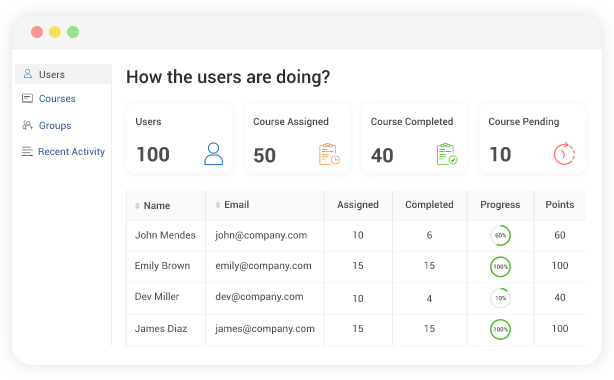
7. Reduce Costs
AI LMS consolidates course creation, tracking, and reporting into one platform, cutting down on costs and unnecessary tools.
The Future of AI LMS: How AI Will Revolutionize Learning & Development
AI LMS is poised to revolutionize Learning & Development (L&D) by offering strategic advantages that benefit employers on every level. Let’s explore the key ways AI LMS will change the future of training and development:
1. Unified Training Platforms
AI will consolidate course creation, content delivery, and progress tracking into one intelligent platform. No more juggling between multiple tools—everything from drafting lessons to measuring outcomes will happen in one place.
Why it matters: You’ll cut costs and streamline operations, getting more value from your L&D budget without the friction of disconnected systems.
2. Hyper-Personalized Journeys
Courses will dynamically adapt to individual performance, roles, and goals. AI will analyze how each person learns and tailor the content accordingly—no more one-size-fits-all.
Why it matters: Learners stay engaged and motivated because the training feels relevant and timely, improving retention and real-world application.
3. Predictive Compliance
Instead of static modules, AI will anticipate compliance risks based on learner behavior and job roles. It will update training content and send smarter reminders before gaps appear.
Why it matters: Ensures your team stays compliant without constant manual oversight, reducing both risk and administrative load.
4. Internal Mobility Tools
AI will map out employee growth paths by analyzing performance, learning history, and engagement. It will match team members with new roles, projects, or upskilling opportunities internally.
Why it matters: Boosts retention and reduces hiring costs by helping you grow talent from within—faster and more strategically.
5. Skill Forecasting
Using trend analysis and employee data, AI will predict which skills your workforce will need 6–12 months ahead of time, allowing proactive development.
Why it matters: Future-proofs your team by aligning learning investments with where your industry is headed.
6. Content Auto-Generation
AI will update or generate course material in real-time based on industry trends, learner feedback, and performance data—no manual edits needed.
Why it matters: Saves time and ensures your training content stays fresh, accurate, and relevant without constant intervention.
7. Proactive Analytics
AI dashboards will evolve from tracking what’s happening to advising on what to do next. They’ll flag drop-offs, recommend interventions, and optimize learning paths automatically.
Why it matters: Helps you make smarter decisions, faster—so your training strategies stay aligned with both learner needs and business goals.
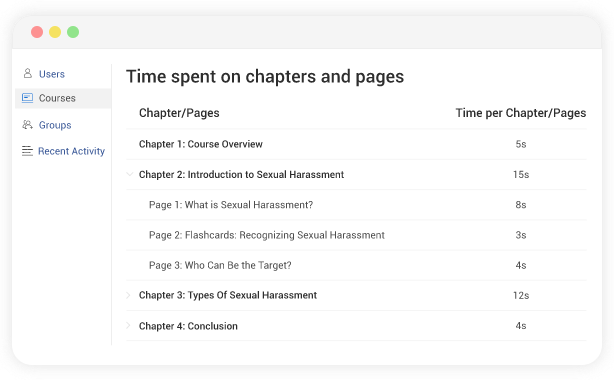
Make the Shift to Smarter Training
The future of learning and development is here, and it’s time to upgrade to an AI-powered LMS. The benefits of switching to an AI LMS are clear: from efficiency gains to personalized learning and scalability, AI has the potential to transform your training programs. Investing in an AI LMS today means higher engagement, smarter compliance tracking, and a long-term ROI that will position your company for success as it grows.
Key Takeaways:
- Boost Efficiency: Automate repetitive tasks and free up time for more strategic initiatives.
- Scale With Ease: Manage growing teams and provide personalized learning paths for each employee.
- Stay Compliant: Ensure compliance with automated reminders and up-to-date training content.
- Engage Learners: Increase learner engagement through personalized, interactive, and gamified content.
By exploring AI LMS platforms like ProProfs, you can experience how AI-driven solutions can significantly improve your training programs. It also offers a forever free plan, helping you to explore the platform and its capabilities without any initial commitment.
Remember, the transition to AI is not just a technical upgrade, but a strategic investment in the future of learning and development.
Try Out ProProfs LMS Software For Free. Create, share, and track courses and tests easily.
Get Free LMS Software — All Features, Forever.
We've helped 567 companies train 200,000+ employees. Create courses in under a minute with our AI LMS or use 200+ ready-made courses on compliance, harassment, DEI, onboarding, and more!
Learn More About AI LMS (FAQs)
Do you need technical knowledge to implement an AI LMS?
No, you don’t need technical expertise to implement an LMS with AI capabilities. Most modern AI-powered LMS platforms, like ProProfs, are designed to be user-friendly and easy to set up, even if you don’t have a technical background. The process usually involves simple steps, like selecting your course structure, uploading content, and customizing your settings. Plus, many platforms offer support resources and onboarding assistance to guide you through the process.
Can I add multiple instructors in AI LMS?
Yes, you can definitely add multiple instructors in an LMS with AI capabilities! This feature makes it easy to manage different courses and learners. You can assign specific instructors to specific courses or groups, giving them control over the content and progress of their learners. It’s a great way to streamline training, especially if you have a large team or multiple departments. For more, watch:
How can an AI-powered LMS benefit learners?
An AI-enabled LMS personalizes learning by adapting to each learner’s needs and progress. It recommends content based on strengths and areas for improvement, offering instant feedback to keep you on track. With engaging, interactive content and gamification it makes learning more enjoyable and effective, ensuring a more tailored and motivating experience.
How to Choose the Right LMS?
To choose the right LMS, start by thinking about your goals—do you need employee training, customer education, or something else? Look for ease of use, strong support, and features like tracking and mobile access. Try a demo, compare options, and read reviews. The right fit should match your needs, not overwhelm you.
What is an example of LMS?
An example of an LMS is ProProfs Training Maker. It’s an AI-enabled LMS that simplifies course creation, learner management, and progress tracking all in one platform. Whether you need to create training content quickly or track how your employees are doing, ProProfs provides a user-friendly solution to help you manage it all efficiently. With AI-driven features, it helps personalize learning paths and automate tasks, saving you time and effort.
Is there a free LMS?
Yes, there is! ProProfs Training Maker offers a forever-free plan. This free plan gives you access to basic features, so you can start creating and managing courses without any cost. It’s a great way to try out the platform and see how it can help streamline your training processes. If you need more advanced features, ProProfs also offers premium plans with even more capabilities to grow with your needs.
 Tips
Tips
We’d love to hear your tips & suggestions on this article!
Get Free LMS Software — All Features, Forever.
We've helped 567 companies train 200,000+ employees. Create courses in under a minute with our AI LMS or use 200+ ready-made courses on compliance, harassment, DEI, onboarding, and more!

 We'd love your feedback!
We'd love your feedback! Thanks for your feedback!
Thanks for your feedback!





